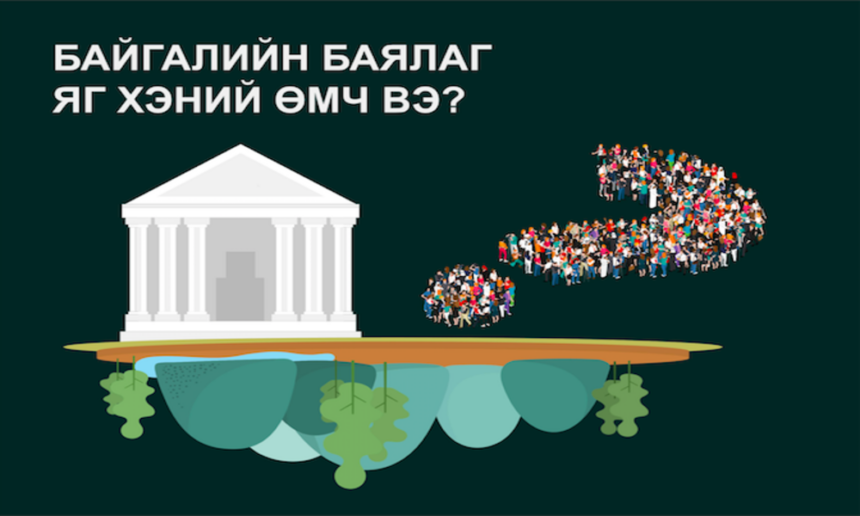In relation to intended amendments to the constitution, Mongolians are currently having a multilateral discussion involving the state, private sector, and civil society. A separate working group was established to align and combine the two draft legislations under review – one proposed by the Mongolian People’s Party, who currently holds the majority in the Parliament, and one initiated by the President. Somewhere along the way, the discussion morphed into the topic of who exactly owns natural resources, which is arguably a bigger subject than the constitution. This important question has never received a clear answer in Mongolia, and we finally have the opportunity to have a broad, public discussion about where the ownership of natural resources sits. Given we have already touched on this subject, we should use the opportunity to create clarity and alignment on concepts and terms with regards to ‘ownership’, ‘state’, and ‘government’.
Difference in principle
The constitution currently states “The land, its subsoil, forests, water, fauna, flora, and other natural resources in Mongolia shall belong exclusively to the people and be under state protection” in its Clause 1, Article 6.
Clause 2, Article 6 currently reads “The land, except given to the citizen of Mongolia for private possession, as well as the subsoil with its mineral wealth, forest, water resources and game shall be the property of the state”. This clause is proposed to be amended by both the Parliament and the President as follows:
- The Parliament has proposed to add “when utilizing natural resources, the state will follow the principles of equality, fairness, national security, and sustainable development” into the existing language.
- The President, on the other hand, proposed that the clause should read “The land, except given to the citizen of Mongolia for private possession, as well as the subsoil with its mineral wealth, forest, water resources and game shall be the property of the public. When utilizing natural resources, the principles of equality, fairness, national security, and sustainable development will be followed.”
In other words, the Parliament is saying that the state owns natural resources, while the President argues it is the property of the public. This is a difference in principle. Depending on how this difference is resolved, we will need to amend not only the constitution but a number of other laws.
Difference in understanding
Mongolia has been using the terms ‘state’ and ‘government’ incorrectly in our laws, and there has not been a clear alignment on the understanding of these two terms. ‘State’ refers to a political entity that does not change, whereas the ‘government’ is replaced through democratic elections. An elected government governs the state, and a government consists of well-balanced three branches – the legislative, executive, and judiciary – that keep oversight over each other.
Starting from the era of monarchy, Mongolia has called its executive branch alone ‘government’. The current constitution accurately defines government as ‘the supreme executive power’ but uses the wrong terminology. The government, in this sense, should be called either ‘Ministerial Council’ or ‘the Cabinet’.
In a democracy, the government is elected by the people, therefore it is the people’s government. When we say ‘public property or ownership’, it conveys the meaning that it belongs to all people, which is prone to be interpreted as ‘it belongs to no one’. Therefore, it would be wiser to say that the land, its subsoil, and natural resources are the property of the people, instead of the state. In accordance with relevant laws, the state and the government have the right to manage the property of the Mongolian people. Since it is impossible to accommodate everyone’s opinion, we have no choice but to give that right to a government set up in a democratic process that is based on the majority of people’s votes. This is the key difference between democracy and other forms of governance.
Form of ownership
A law will need to be passed on how the State and government can manage the property of the people. Many countries have never had an opportunity to organize the ownership of resources in a fair, equitable manner. For example, the Guardian reported that half of England’s land is owned by 1 per cent of the population. In the United States, more than half of the land in most states is owned by the federal government. Also, many countries oppose the concept of ‘state ownership’ because the state as such has not created anything, especially not nature. Therefore, they view that natural resources fall under the public or the people’s ownership. The state and the government receive payments from those who use these resources and spend the revenue on what is needed in the country, including saving up for future generations.
Some countries, including China, Kazakhstan, South Korea, Qatar, and Saudi Arabia, state in their constitution that natural resources are the property of the State, whereas the United States, Australia, Canada, Sweden, Finland, New Zealand, Austria, France, India, Singapore, and Japan do not have any clauses that refer to the ownership of natural resources.
Therefore, we should use terms ‘private ownership’ (pertaining to individuals or legal entities), ‘shared’ or ‘community ownership’ (pertaining to a group of people who reside in the same location), and people’s ownership (pertaining to the ownership of all Mongolians)’, instead of using ‘citizens’ or public ownership’, in our constitution, so that our language is aligned with international practice.
The constitutional amendments cannot be a tool for politicians to beat one another or make political gains. What these amendments should do is clarifying the ownership of all types of properties, which is the basis of our economic advancement. If we manage to achieve clear alignment on terminology regarding ‘state’ and ‘government’, declare natural resources are owned by the people and not by the state, and make it clear how the government can manage these resources, we can say that we have fixed our previous mistakes and have made the necessary amendments to our constitution.
2019.07.31
Trans. by B.Amar












